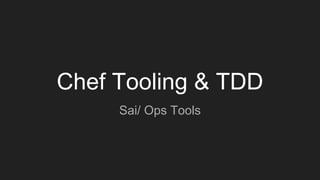Chef tooling and TDD
- 1. Chef Tooling & TDD Sai/ Ops Tools
- 2. Existing Chef Workflow 1. Engineer writes a chef cookbook 2. May perhaps write Minitest suite 3. May spin up vagrant with chef solo 4. Engineer does a `Rake release` a. Json lint b. FoodCritic warnings c. Push to hooks d. Berks upload cookbook
- 3. Chef Tooling â Pre-convergence - Linting, Style and Rules â Unit-tests â Convergence - Integration Tests â Post Convergence
- 4. Cookstyle/Rubocop â Cookstyle - Invoked with Rubocop. Does autocorrection with rules from cookstyle.yml â Rubocop - Static Code analyzes code for Ruby errors and style guidelines > rubocop recipes/counter.rb
- 6. Foodcritic â Flags problems that may cause chef cookbooks to fail â Chef cookbook style guidelines
- 8. Unit Tests ChefSpec â Rspec style unit testing for cookbooks â Help regression testing when making changes â Simulate convergence of resources on node But do we really need this, if we use tools in convergence? â Does not test chef runs â May not catch all failures in spite of perfect run
- 9. Integration Testing # Test Kitchen What is it? â Test Harness â Allows to execute code on one or more platforms in isolation â Cloud Providers, dockers, vagrant and VMs â Supports testing frameworks - Inspec, minitest, Serverspec and BATS â Uses kitchen-vagrant driver for managing vms (just like vagrant-berkshelf)
- 10. Why use Test Kitchen? â Multiple platforms support with single config â Chef-zero does not require additional flags for environment, roles, data bags etc. Not required to add chef-solo conditionals in recipes. â Full in-memory, fast start so chef runs for zero would be faster. â Minitest is no longer actively supported and is being deprecated in favour of inspec :(
- 11. Test kitchen commands â vagrant status â kitchen list â vagrant up â kitchen converge â vagrant provision â vagrant ssh â kitchen login â minitest-handler â kitchen verify (supports inspec, serverspec) â kitchen test (all in one)
- 12. Post-Convergence Inspec â Rspec like tests to ensure state of node â Built in resource types for Chef â Add tests for business assumptions and outcomes
- 13. New Chef Tooling â Cookstyle/Rubocop â FoodCritic â ChefSpec â Test Kitchen â Inspec â Automate into CI 1. Replace hooks with Jenkins jobs that download cookbooks, upload to Chef server
- 14. Other Tools â Cookbook skeleton generator - Bourdain/Chef/Kitchen-cabinet â Bump and release cookbooks - Bourdain â Berkshelf over Policyfiles â Chef Push jobs - Ansible/Rundeck style jobs triggered independently of chef runs
- 15. Sources â https://docs.chef.io â Alex Manly - Chef workflow https://www.youtube.com/watch?v=jauXuwIfgbs&t=49s â Inspec - https://www.inspec.io/tutorials/ â Chef solo to Zero - https://blog.chef.io/2014/06/24/from-solo-to-zero- migrating-to-chef-client-local-mode/ â kitchen.ci















